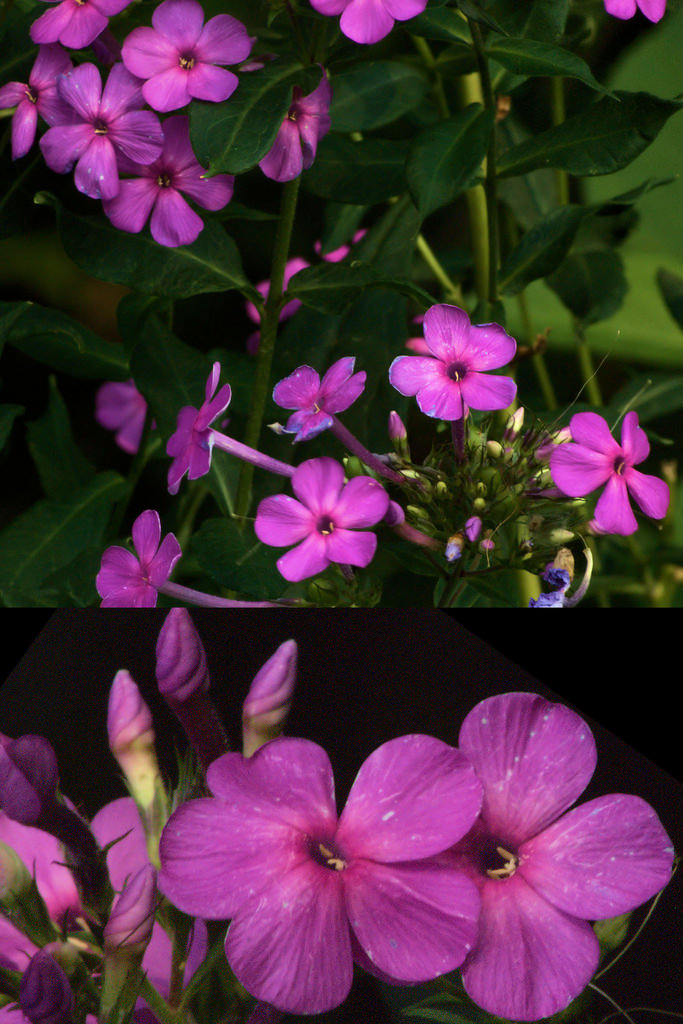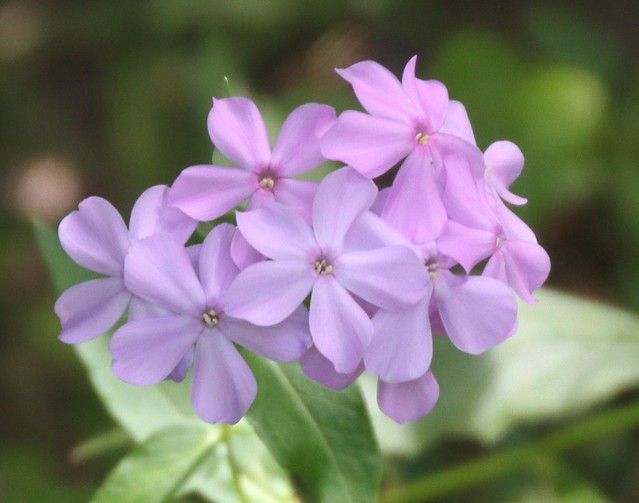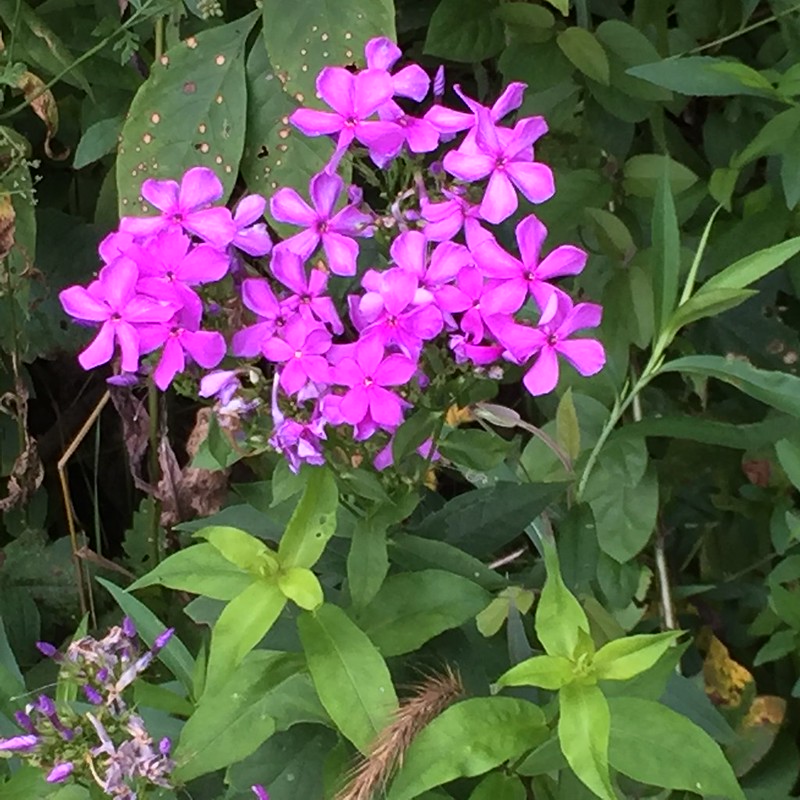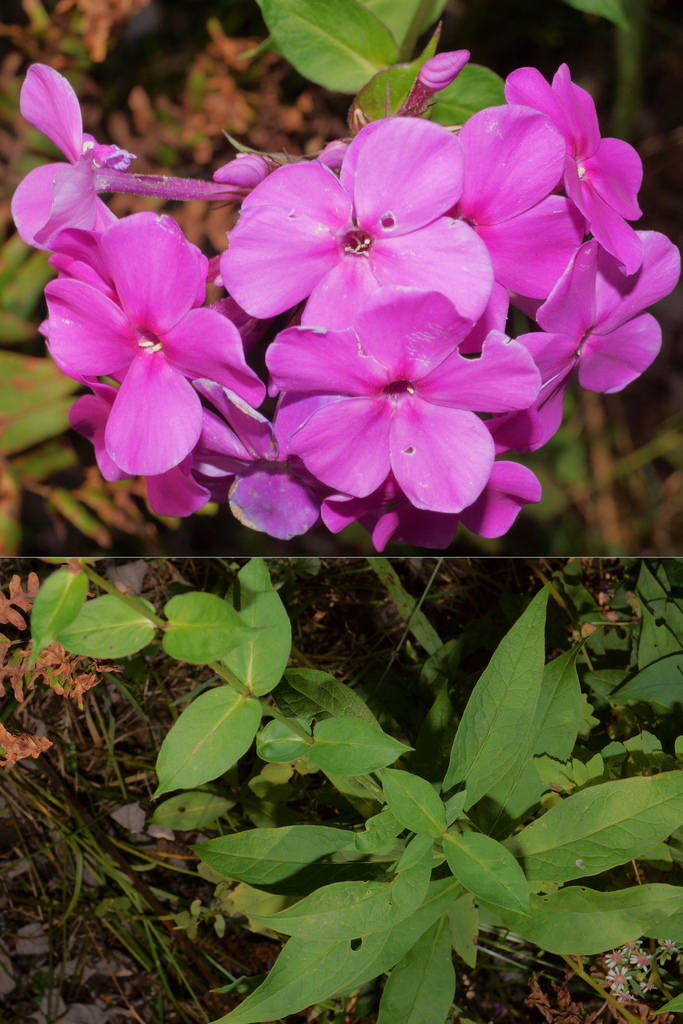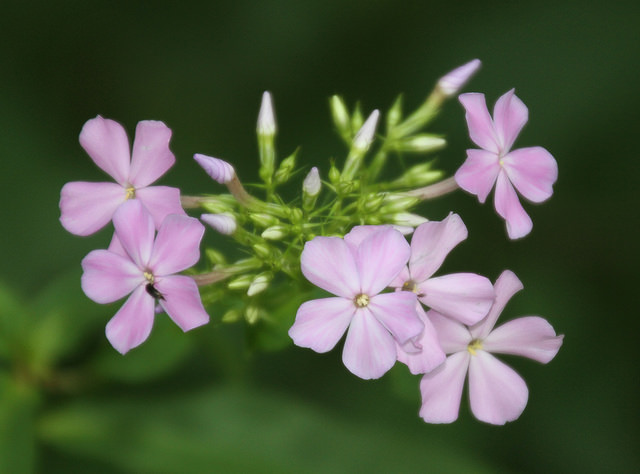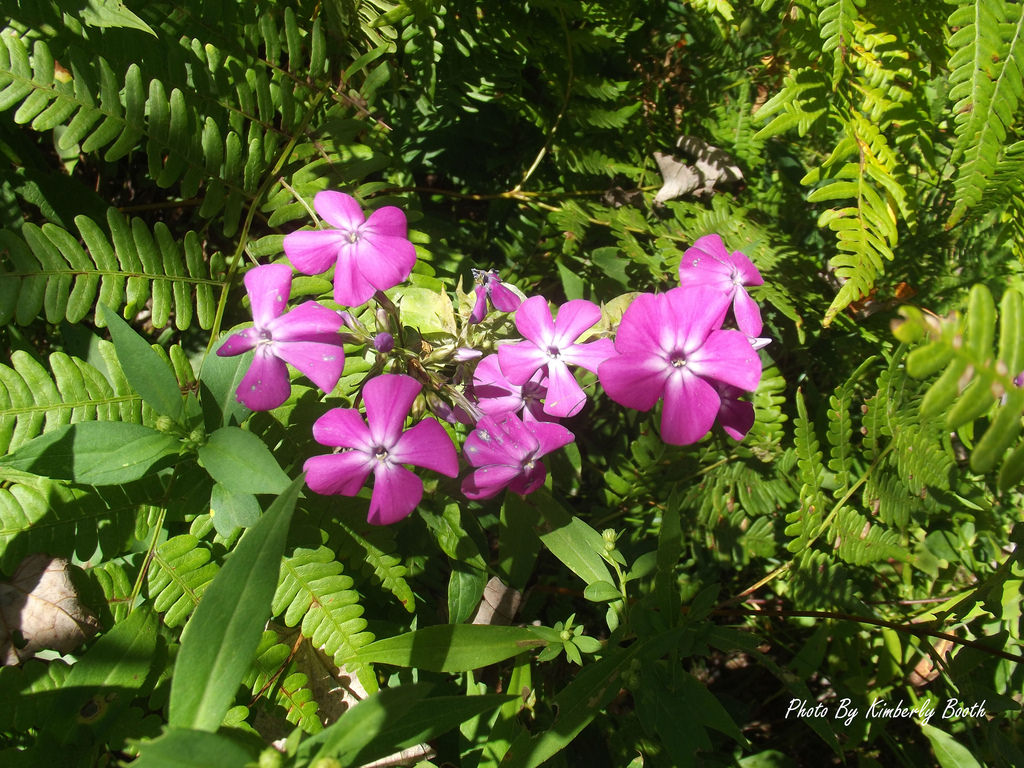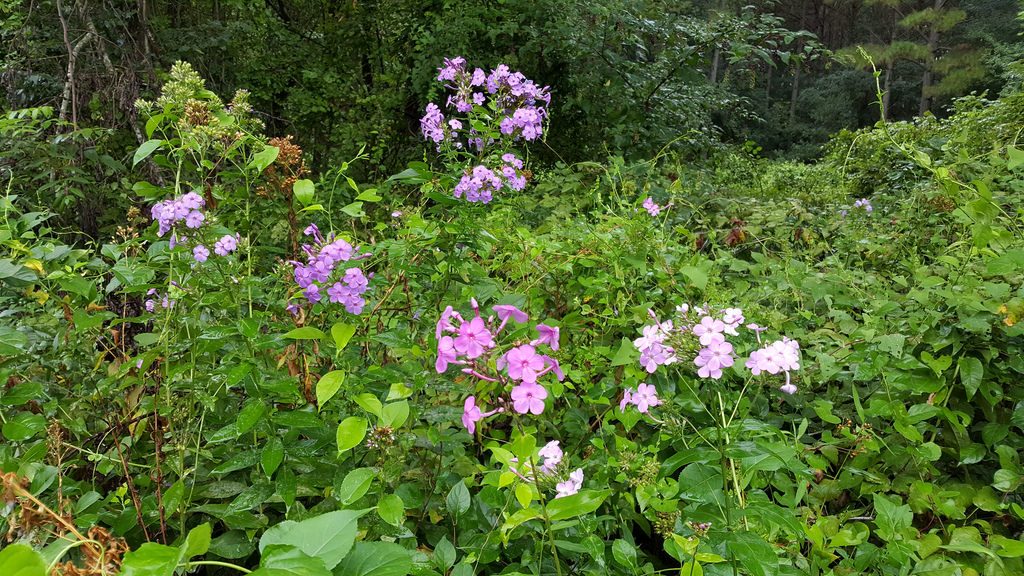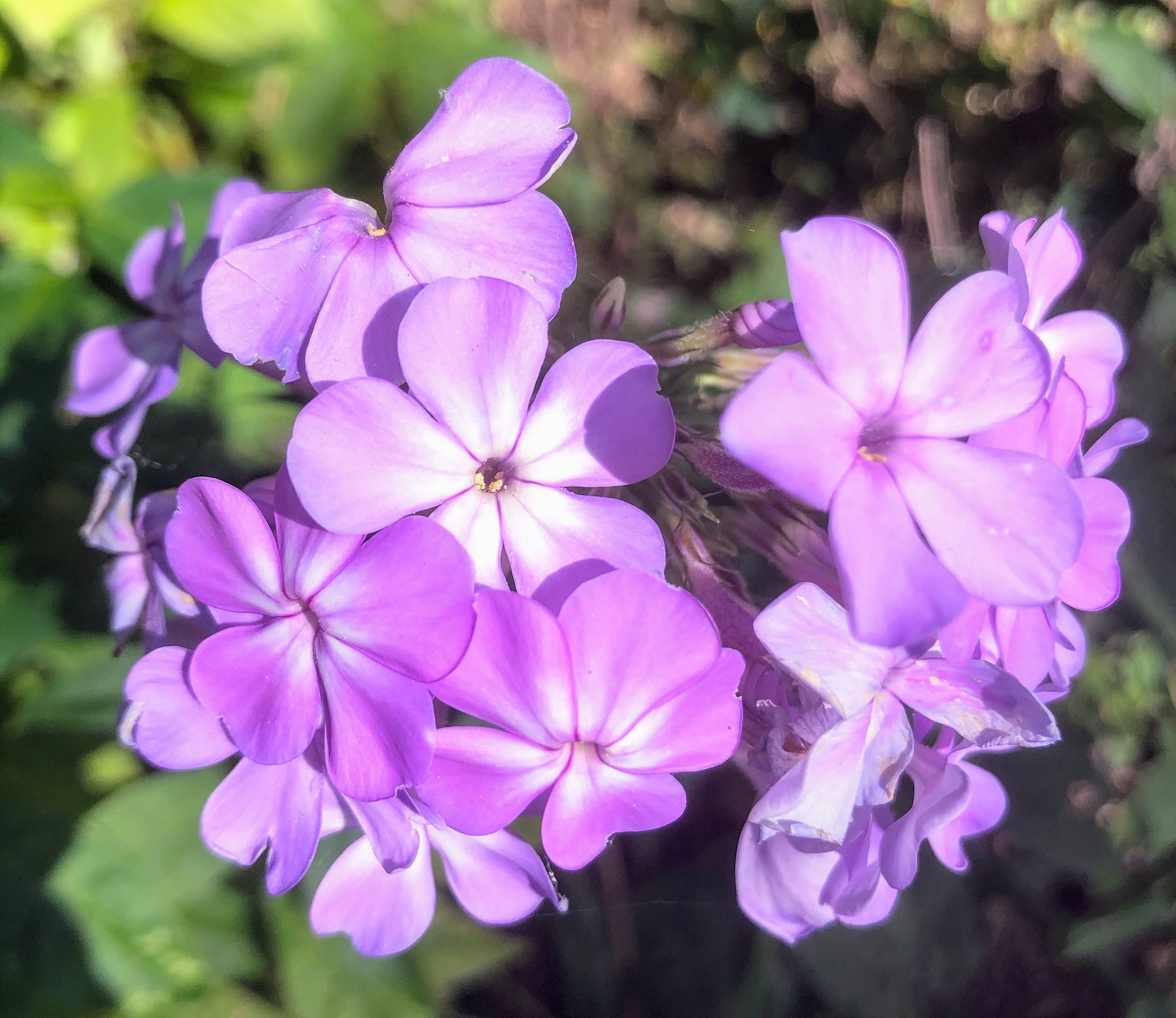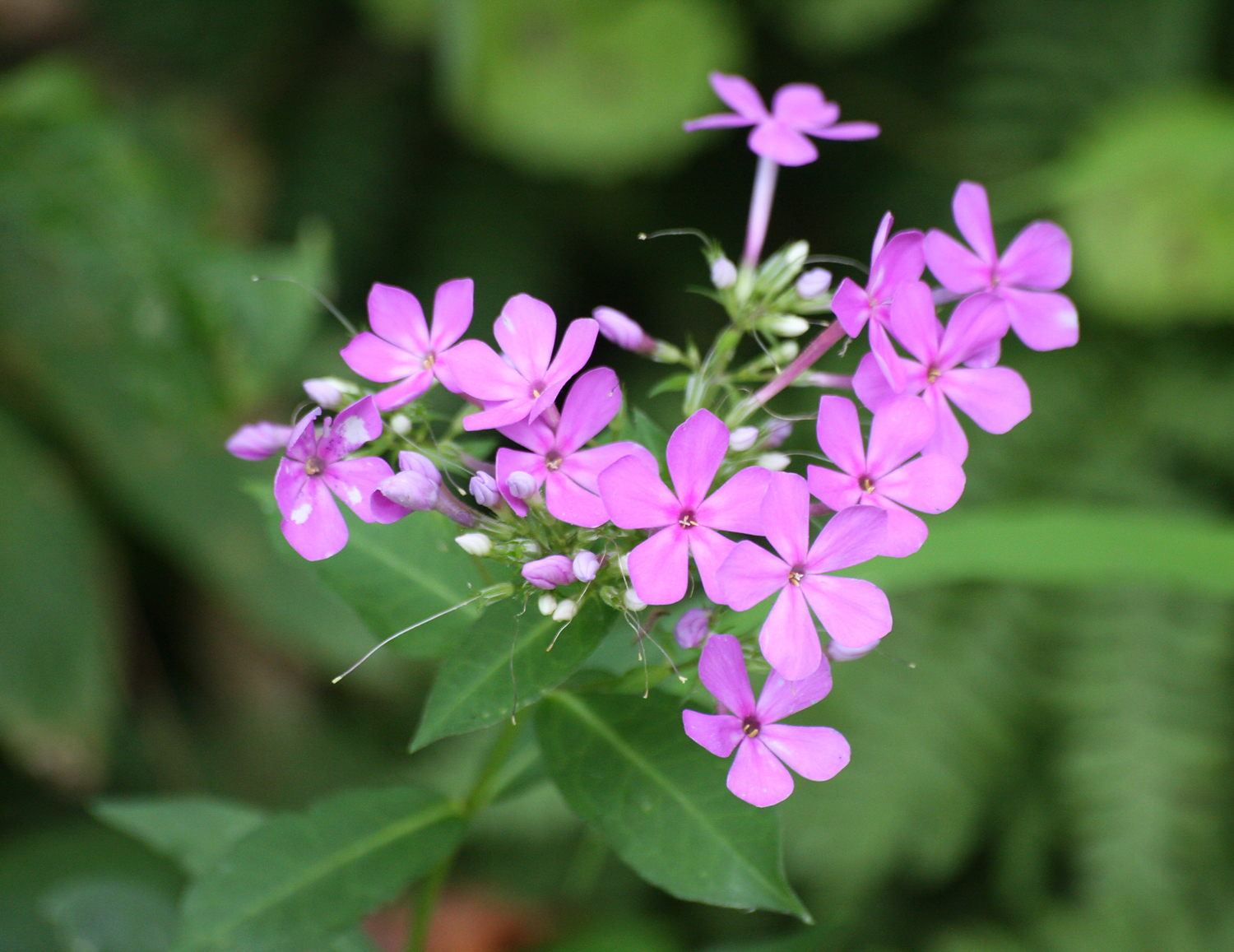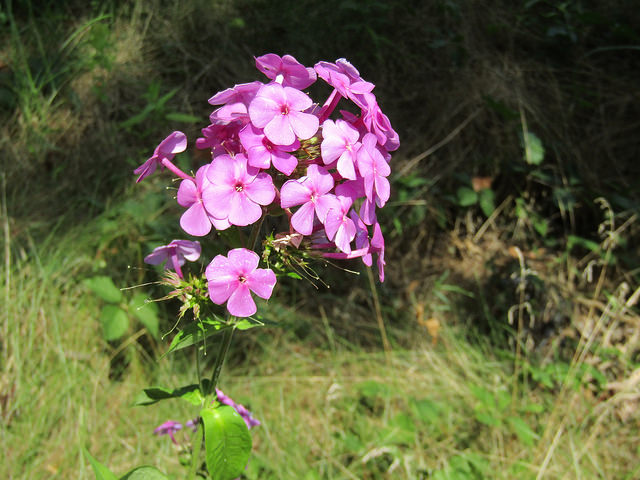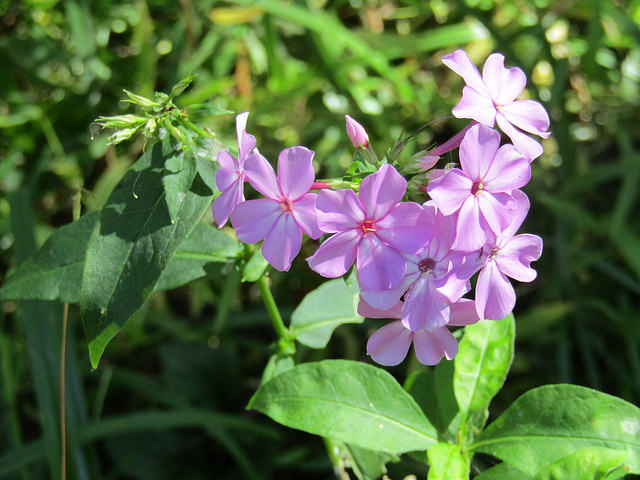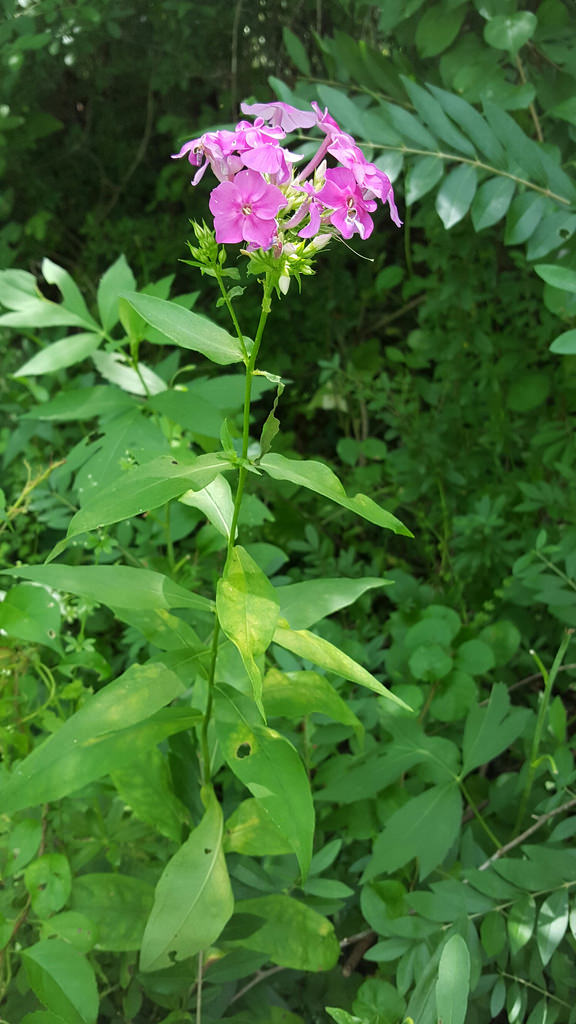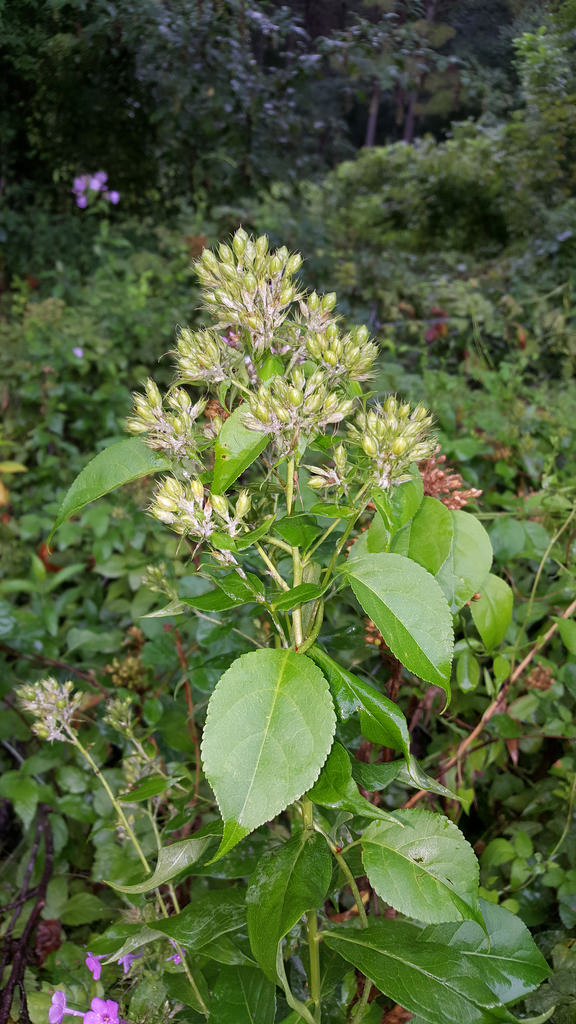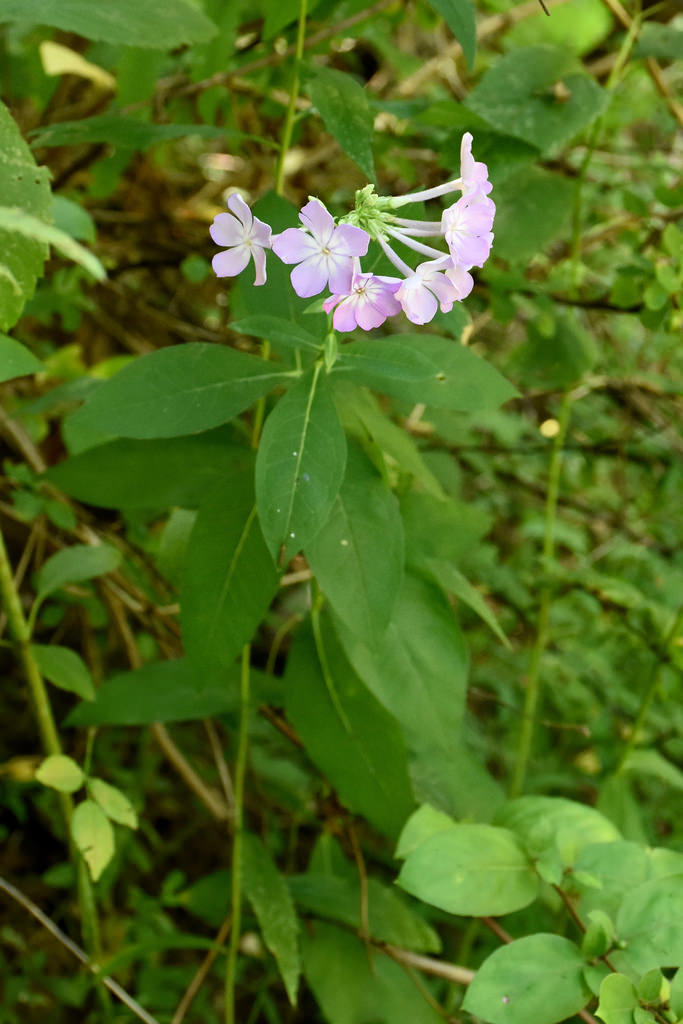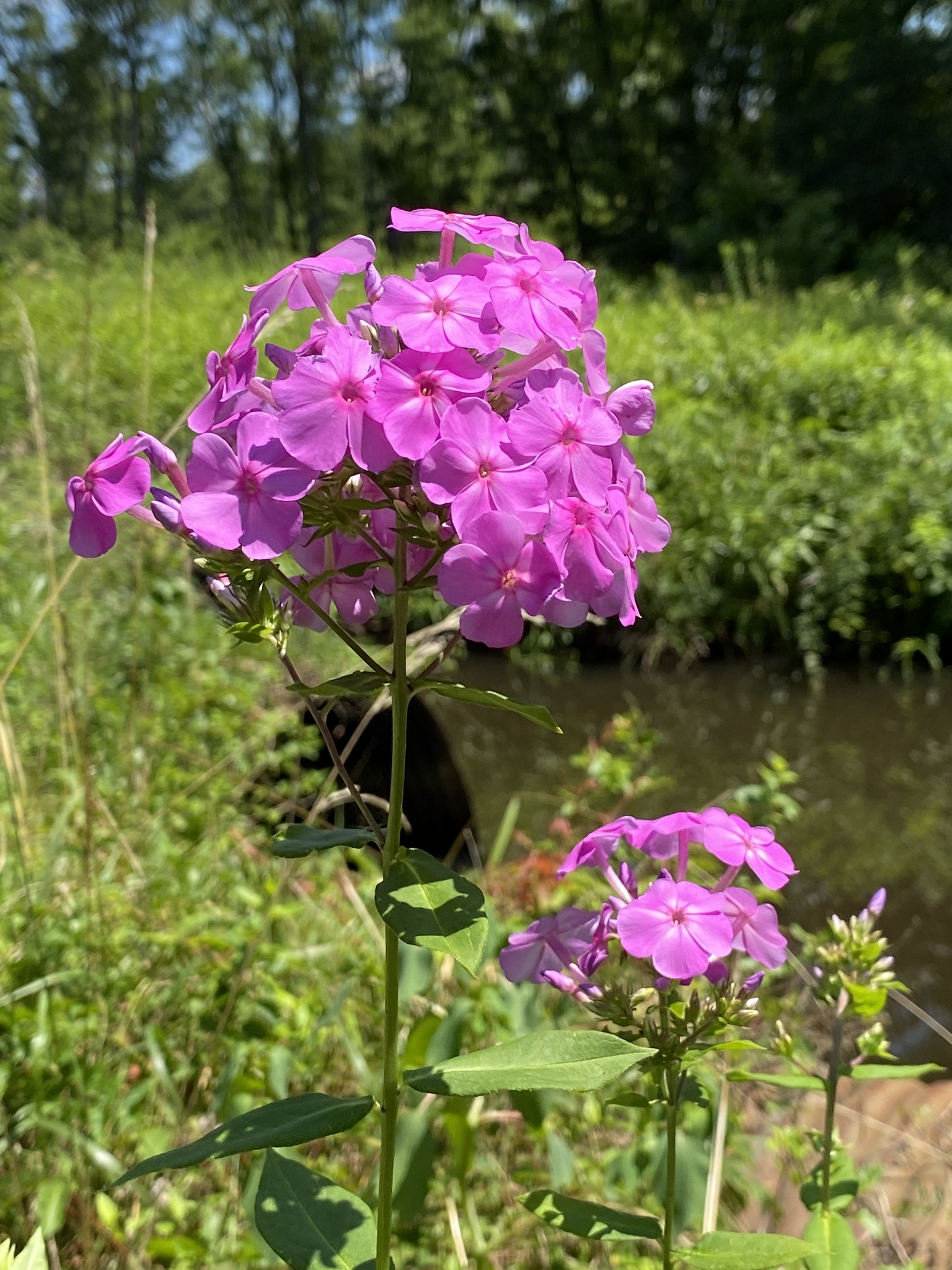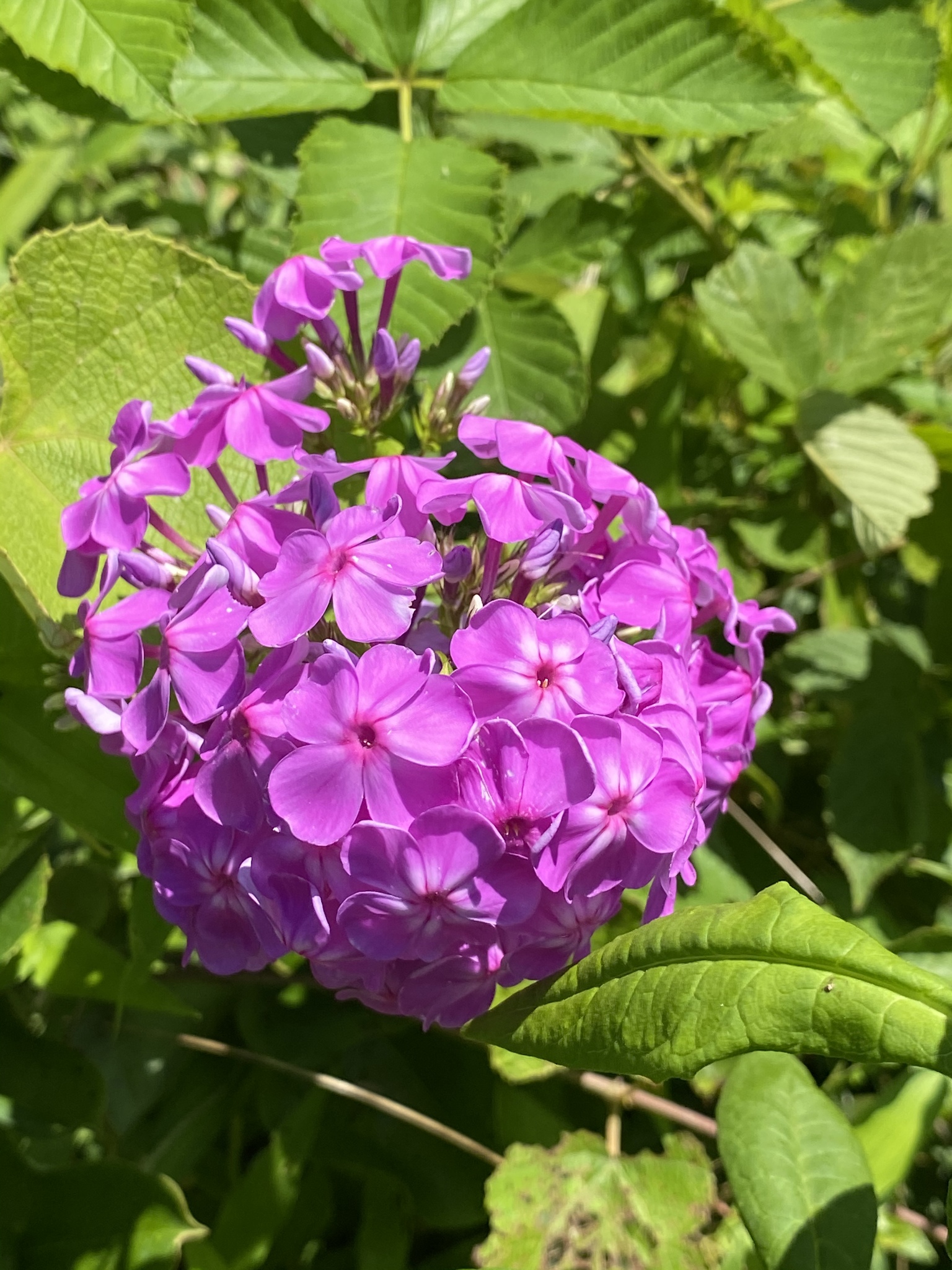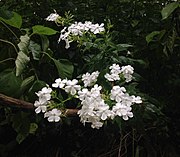Map Snapshot





















226 Records
Seasonality Snapshot
Source: Wikipedia
| Phlox paniculata | |
|---|---|

| |
| Cultivar ‘Eva Cullum’ | |
| Scientific classification | |
| Kingdom: | Plantae |
| Clade: | Tracheophytes |
| Clade: | Angiosperms |
| Clade: | Eudicots |
| Clade: | Asterids |
| Order: | Ericales |
| Family: | Polemoniaceae |
| Genus: | Phlox |
| Species: | P. paniculata
|
| Binomial name | |
| Phlox paniculata L. (1753)
| |
Phlox paniculata is a species of flowering plant in the phlox family (Polemoniaceae). It is native to parts of the eastern and central United States. It is extensively cultivated in temperate regions as an ornamental plant[1] and has become established in the wild in scattered locales in other regions.[2][3] Common names include fall phlox,[4] garden phlox,[5] perennial phlox,[6][7] summer phlox,[6][8] and panicled phlox.[9]
Description
[edit]Phlox paniculata is an erect herbaceous perennial growing to 120 cm (47 in) tall by 100 cm (39 in) wide, with opposite, simple leaves on slender green stems. The flowers are 1.5–2.5 cm (0.6–1.0 in) in diameter, often strongly fragrant and borne in summer through fall (autumn).[10] The flowers are grouped in panicles (with many branching stems), hence the specific epithet paniculata.[11] Typical flower colors in wild populations are pink or purple (rarely white).[12]
Distribution and habitat
[edit]Fall phlox is native to parts of the central and eastern United States. It occurs as an introduced species in other parts of the United States,[2] Canada,[9], Europe,[13] and Asia.[13] In the Chicago Region it is questionably native, or native populations may have all been destroyed: "populations in our area appear to be escapes from gardens to nearby woods and waste ground, which no doubt accounts for all collections since 1945".[14]
In its natural range, it grows along streambanks and in moist wooded areas.[5]
Cultivation
[edit]Phlox paniculata is grown largely for its showy fragrant flowers in high summer. It requires a sheltered spot with full sun or partial shade, in fertile moist soil. Plants may be propagated by division or root cuttings in autumn, or by basal cuttings in spring.[15]
Plants make excellent cut flowers. In hot, dry areas they are sensitive to powdery mildew, and affected stems should be removed immediately.[16]
Cultivars
[edit]
Many cultivars have been developed for garden use. The following have gained the Royal Horticultural Society's Award of Garden Merit:
- ’Alba Grandiflora’[17] (white)
- ’Becky Towe’[18] (pink, variegated leaves)
- ’Danielle’[19] (white)
- ’David’[20] (white)
- ’Eva Cullum’[21] (deep pink)
- ’Eva Foerster’[22] (pink/white)
- ’Flamingo’[23] (bright pink)
- ’Franz Schubert’[24] (pale pink/purple)
- ’Grenadine Dream’[25] (red/purple)
- ’Grey Lady’[26] (lavender-grey)
- ’Luc’s Lilac’[27]
- ’Le Mahdi’[28] (violet blue)
- ’Miss Elie’[29] (pink)
- ’Miss Mary’[30] (deep pink)
- ’Miss Pepper’[31] (pale pink/deep pink)
- ’Monica Lynden-Bell’[32] (pale pink)
- ’Mother of Pearl’[33] (pearl white)
- ’Norah Leigh’[34] (pale/dark pink, variegated)
- Peacock Cherry Red’[35]
- Peacock Lilac[36]
- Peacock Neon Purple[37]
- Peacock White[38]
- ’Prince of Orange’[39] (orange-red)
- ’Prospero’[40] (lilac/white)
- Purple Eye Flame[41] (purple/white)
- ’Rosa Pastell’[42] (pale pink)
- ’Starfire’[43] (crimson)
- ’Uspekh’[44] (violet/white)
- ’Utopia’[45] (pale pink)
- ’Velvet Flame’[46] (purple/white)
- ’Visions’[47] (pale/medium pink)
- ’White Admiral’[48] (white)
Uses
[edit]The plant has been used medicinally, with the leaf extract serving as a laxative and to treat boils.[49]
References
[edit]- ^ Fine Gardening Plant Guide, Garden phlox, Phlox paniculata
- ^ a b "Phlox paniculata". County-level distribution map from the North American Plant Atlas (NAPA). Biota of North America Program (BONAP). 2014.
- ^ "Phlox pannocchiuto, Phlox paniculata L." Altervista Flora Italiana.
- ^ NRCS. "Phlox paniculata". PLANTS Database. United States Department of Agriculture (USDA).
- ^ a b Weakley, Alan S. (2018), Flora of the Southern and Mid-Atlantic States, working draft of 20 August 2018, University of North Carolina Herbarium, North Carolina Botanical Garden, University of North Carolina at Chapel Hill
- ^ a b "Phlox paniculata in Flora of Missouri @ efloras.org". www.efloras.org. Retrieved 30 August 2020.
- ^ Reznicek, A. A.; Voss, E. G.; Walters, B. S., eds. (February 2011). "Phlox paniculata". Michigan Flora Online. University of Michigan Herbarium. Retrieved 30 August 2020.
- ^ Nowick, Elaine (2014). Historical common names of Great Plains plants, with scientific names index. Lulu.com. ISBN 9781609620585.
- ^ a b Brouillet L, Desmet P, Coursol F, Meades SJ, Favreau M, Anions M, Bélisle P, Gendreau C, Shorthouse D, et al. (2010). "Phlox paniculata Linnaeus". Database of Vascular Plants of Canada (VASCAN). Retrieved 30 August 2020.
- ^ RHS A-Z encyclopedia of garden plants. United Kingdom: Dorling Kindersley. 2008. p. 1136. ISBN 978-1405332965.
- ^ Harrison, Lorraine (2012). RHS Latin for gardeners. United Kingdom: Mitchell Beazley. p. 224. ISBN 9781845337315.
- ^ Yatskievych, George (2013). Flora of Missouri, Volume 3. Missouri Botanical Garden Press. p. 6297.
- ^ a b "Phlox paniculata L." Plants of the World Online. Royal Botanic Gardens, Kew. Retrieved 30 August 2020.
- ^ Wilhelm, Gerould; Rericha, Laura (2017). Flora of the Chicago Region: A Floristic and Ecological Synthesis. Indiana Academy of Sciences.
- ^ BBC 2019.
- ^ "Garden Phlox Plants: Tips For Growing And Care". Gardening Know How. Retrieved 11 October 2019.
- ^ "RHS Plantfinder - Phlox paniculata 'Alba Grandiflora'". Retrieved 25 April 2018.
- ^ "RHS Plantfinder - Phlox paniculata 'Becky Towe'". Retrieved 25 April 2018.
- ^ "RHS Plantfinder - Phlox paniculata 'Danielle'". Retrieved 25 April 2018.
- ^ "RHS Plantfinder - Phlox paniculata 'David'". Retrieved 25 April 2018.
- ^ "RHS Plantfinder - Phlox paniculata 'Eva Cullum'". Retrieved 25 April 2018.
- ^ "RHS Plantfinder - Phlox paniculata 'Eva Foerster'". Retrieved 25 April 2018.
- ^ "RHS Plantfinder - Phlox paniculata 'Flamingo'". Retrieved 25 April 2018.
- ^ "RHS Plantfinder - Phlox paniculata 'Franz Schubert'". Retrieved 25 April 2018.
- ^ "RHS Plantfinder - Phlox paniculata 'Grenadine Dream'". Retrieved 25 April 2018.
- ^ "RHS Plantfinder - Phlox paniculata 'Grey Lady'". Retrieved 25 April 2018.
- ^ "RHS Plantfinder - Phlox × arendsii 'Luc's Lilac'". Retrieved 25 April 2018.
- ^ "RHS Plantfinder - Phlox paniculata 'Le Mahdi'". Retrieved 25 April 2018.
- ^ "RHS Plantfinder - Phlox paniculata 'Miss Elie'". Retrieved 25 April 2018.
- ^ "RHS Plantfinder - Phlox paniculata 'Miss Mary'". Retrieved 25 April 2018.
- ^ "RHS Plantfinder - Phlox paniculata 'Miss Pepper'". Retrieved 25 April 2018.
- ^ "RHS Plantfinder - Phlox paniculata 'Monica Lynden-Bell'". Retrieved 25 April 2018.
- ^ "RHS Plantfinder - Phlox paniculata 'Mother of Pearl'". Retrieved 25 April 2018.
- ^ "RHS Plantfinder - Phlox paniculata 'Norah Leigh'". Retrieved 25 April 2018.
- ^ "RHS Plantfinder - Phlox paniculata Peacock Cherry Red". Retrieved 25 April 2018.
- ^ "RHS Plantfinder - Phlox paniculata Peacock Lilac". Retrieved 25 April 2018.
- ^ "RHS Plantfinder - Phlox paniculata Peacock Neon Purple". Retrieved 25 April 2018.
- ^ "RHS Plantfinder - Phlox paniculata Peacock White". Retrieved 25 April 2018.
- ^ "RHS Plantfinder - Phlox paniculata 'Prince of Orange'". Retrieved 25 April 2018.
- ^ "RHS Plantfinder - Phlox paniculata 'Prospero'". Retrieved 25 April 2018.
- ^ "RHS Plantfinder - Phlox paniculata Purple Eye Flame". Retrieved 25 April 2018.
- ^ "RHS Plantfinder - Phlox paniculata 'Rosa Pastell'". Retrieved 25 April 2018.
- ^ "RHS Plantfinder - Phlox paniculata 'Starfire'". Retrieved 25 April 2018.
- ^ "RHS Plantfinder - Phlox paniculata 'Uspekh'". Retrieved 25 April 2018.
- ^ "RHS Plantfinder - Phlox × arendsii 'Utopia'". Retrieved 25 April 2018.
- ^ "RHS Plantfinder - Phlox paniculata 'Velvet Flame'". Retrieved 25 April 2018.
- ^ "RHS Plantfinder - Phlox paniculata 'Visions'". Retrieved 25 April 2018.
- ^ "RHS Plantfinder - Phlox paniculata 'White Admiral'". Retrieved 25 April 2018.
- ^ Niering, William A.; Olmstead, Nancy C. (1985) [1979]. The Audubon Society Field Guide to North American Wildflowers, Eastern Region. Knopf. p. 697. ISBN 0-394-50432-1.
Bibliography
[edit]- "How to propagate phlox". Gardeners' World. BBC. 24 September 2019. Retrieved 4 February 2021.
